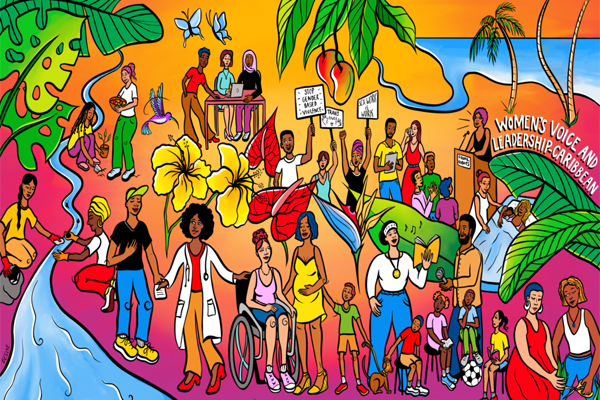
A United Nations push for disaster preparedness has broadly involved Caribbean nations in the past month.
A recent United Nations Disaster Risk Reduction conference in Uruguay lauded the Caribbean’s regional response to La Soufriere’s 2021 eruption in St. Vincent and the Grenadines. It was recognized internationally, and “stands as a textbook example of how early warning and community engagement minimized loss of property and lives” — in fact, no one died in the aftermath of the eruption.
“But the case is also a cautionary tale about the challenges disaster specialists everywhere face in the race to save lives as natural disasters become more frequent and more powerful,” reports the Miami Herald.
The experience of the University of the West Indies Seismic Research Center in Trinidad and Tobago — which led the early response to La Soufriere, but continues to struggling to get the funding it needs from regional governments — shows that achieving the goal will require more than simply installing a monitor or sending out danger-pending text alerts, writes Jacqueline Charles.
A U.N. push to improve disaster preparedness has been welcomed by the Caribbean Disaster Emergency Management Agency, a regional intergovernmental agency based in Barbados, which has since 2017, been putting emphasis on the need for multi-hazard early warning systems in countries.
The emergency management agency started an early warning system consortium that works collaboratively with a range of Caribbean institutions to address the lack of capacity in individual countries, helping them build a road map on how to develop early warning systems and offering guidance on needed legislation and regulations.
At the Uruguay event, researchers and officials from across the region highlighted the need for people-centric, youth-focused and non-formulaic recovery plans that included the input of the communities in which they are implemented. (Relief Web)
Separately, Barbados Prime Minister Mia Mottley has called for two emergency ships to be stationed in the Caribbean to provide rapid response to countries in the aftermath of a disaster. Mottley pointed out that when disasters hit, they strike across national boundaries — and our preparations and responses need be united. (Relief Web)
“Islands don’t have the benefit of road networks to deliver quickly and in some instances, [airport] runways will be destroyed in disasters,” Mottley said as she addressed the live-streamed regional launch of the United Nations Early Warnings for All Initiative (EW4ALL) for the Caribbean. (Barbados Today)
The event aimed to mobilize Prime Ministers to support the EW4ALL in the face of mounting climate hazards. 2021 was the region’s fourth costliest hurricane season on record, with 21 named storms, including seven hurricanes. (United Nations)
A UN report last year noted that less than half of all countries are not protected by multi-hazard early warning systems, which are among the most proven, cost-effective climate adaptation measures. Not only do they save lives, reducing disaster mortality by a factor of eight, but they also reduce economic losses in the aftermath of climate catastrophes.
“The number of weather-related disasters around the world has risen fivefold over the past 50 years, yet not all countries in the Caribbean have end-to-end early warning systems,” said Petteri Taalas, the World Meteorological Organization Secretary-General.
Racial Justice and Reparations
- British Labour MP Clive Lewis has called on Prime Minister Rishi Sunak to enter negotiations with Caribbean leaders on paying reparations for Britain’s role in slavery.
- Speaking at a parliamentary debate on promoting financial security in the Caribbean, Lewis said the issue of reparations could not be dismissed as an obsession among a small group of “so-called woke extremists”. (Guardian, see Just Caribbean Updates for Feb. 8)
Finance and Economics
- “Suriname’s debt limbo is emblematic of a broader problem: The world lacks an effective framework for dealing with post-pandemic debt crises, Daniel Munevar, an economic affairs officer at the United Nations Conference on Trade and Development (UNCTAD), told Foreign Policy.” (Latin America Brief and see Feb. 23’s Just Caribbean Updates)
Democratic Governance
- Several Surinamese organizations of civil society, including BINI – the Citizens’ Initiative for Participation and Good Governance – decided not to accept the government’s invitation to consultations aimed at developing an ‘agenda for the national dialogue’, following anti-government protests last month. The organization argued that its contributions to such an agenda have already been submitted in the past. The Association of Economists in Suriname and C-47 took a similar stance, reports Star Nieuws. (See Feb. 23’s Just Caribbean Updates)
- Guyanese Vice President Bharrat Jagdeo has expressed support for the police’s zero-tolerance approach towards persons committing acts of violence during protests. (Loop News)
- If Haiti’s deteriorating cascading crises are left unchecked, they will further destabilize and could spill over into other countries in the region, warned the U.N. in a new report. The report concludes that if the situation in Haiti continues to deteriorate and its security and development institutions disintegrate, “a significant international response will be required, including large-scale relief assistance and a stabilization or peace support operation.” (Miami Herald)
- Haitian journalist and democracy activist Monique Clesca, a member of the Commission to Search for a Haitian Solution to the Crisis, spoke to The New Humanitarian regarding Haiti’s dramatic descent and what a Haitian solution could look like.
Migration
- Population concentration in coastal areas and lack of climate-resilient infrastructure in the Caribbean has made hurricane seasons damaging and often lethal. Changing weather patterns have brought less rainfall and frequent drought to some parts of the Caribbean and flooding in others, adding to migration pressures, according to a new Global Americans Report. “The Caribbean has a history of migration, but the severe nature of climate change in theregion and the rapidity of such changes could push entire countries from the lands of their birth.”
The Caribbean and the World
- Caricom’s “foreign policy establishment ought to confront the reality that alliance politics regarding great-power competition are back with a vengeance,” argues Nand Bardouille at the Latin American Focus Group.
- A mysterious ailment that afflicted hundreds of members of the U.S. diplomatic corps, known as “Havana syndrome,” did not result from the actions of a foreign adversary, according to a report that caps a years-long effort by the CIA and several other U.S. intelligence agencies to understand the phenomenon, reports the Washington Post.
- “The Havana syndrome saga is an epic failure of science, one with severe consequences both for patients and for international relations, which reveals how medical evidence warps under political pressure. … Beyond misinforming the public, its story distorted U.S. policy decisions and, most important, deepened patients’ suffering,” according to the Scientific American.
Food Security
- Climate change has indirectly impacted the quantity of flying fish in Barbadian waters — a significant cultural as well as environmental issue, writes Daphne Ewing-Chow in Forbes.
Climate Justice and Energy
- The Caribbean is one of the most vulnerable regions in the world and with limited resources, the region is unable to effectively fight climate change, according to Caricom Chairman Philip Davis, who called for countries responsible for the climate crisis to be held accountable. (Climate Tracker)“We being least among the emitters, we need to hold responsible the major industrialized countries that emit the greenhouse gases into the air and they ought to pay for their sins,” Davis said.
- Guyana should create a billion-dollar fund for a Caribbean energy alliance focused on preparing the island states for climate change, improving resiliency and developing renewable energy, proposed Jan Mangal in the Latin America Energy Advisor.
- Jamaica is suffering from a worrisome land degradation problem. While Jamaica begins to look at how to address this problem, it is studying how other countries in the region are addressing this issue and how climate finance is being accessed — Climate Tracker.
- Saint Lucia’s Jade Mountain Resort took home the top recognition in the 2022 Caribbean Sustainable Tourism Awards of Caribbean Tourism Organization, in the category Excellence in Sustainable Tourism. (Loop News)
Human Rights
- Incidents of revenge porn targeting Bermudian youth spiked during the coronavirus (COVID-19) pandemic, though data is only now coming to light, reports Loop News.
LGBTQ
- The last of Trinbagonian gender activist and writer Amílcar Sanatan’s series of pieces on social activism and the faiths. “I write to inspire other believers and authorities in the Church to find the courage to challenge homophobias in the institution and our society. Discrimination, intolerance and lack of understanding of people in the margins bring us neither closer to heaven nor a just society.”
Events
- 17 March — Training on Treaty Bodies — UN Voluntary Fund for Indigenous Peoples — Register
- 23 March — Community hangout: Championing the Escazú Agreement in the Caribbean — Climate Tracker — Register
- 23 March — “Civil Society and Social Movements in Small States: The Caribbean”— The Islands and Small States Institute of the University of Malta — Register
Opportunities
- 2023 Summer Internship Program – Graduate Interns (Consultant) — IDB
- Amnesty International — Caribbean Region Regional Researcher — More Info
Just Caribbean Updates
https://caribbeannewsupdates.blogspot.com/












